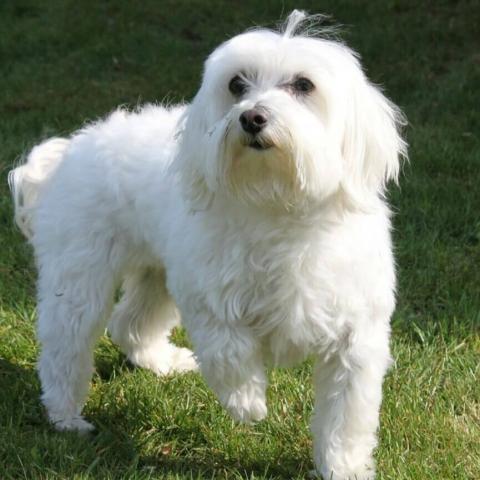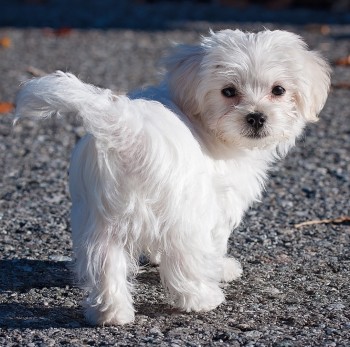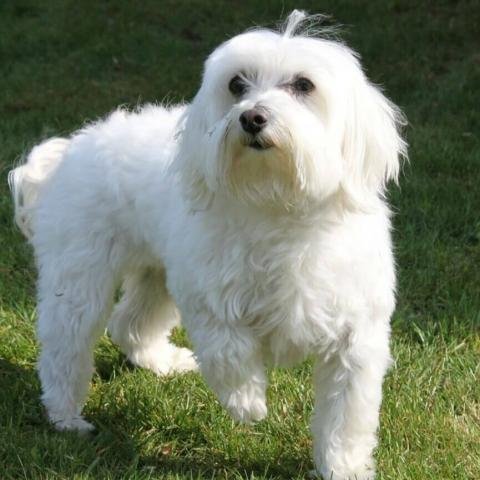Have you ever wondered why your Maltese is so mean? Despite their reputation for being gentle and friendly, some Maltese dogs can display aggressive behavior. It’s surprising to think that such a small and adorable breed can have a mean streak.
The root causes of a mean Maltese can often be traced back to their upbringing and environment. Maltese dogs that have been mistreated or not properly socialized may become aggressive as a defense mechanism. Additionally, inadequate training and lack of discipline can contribute to their mean behavior. However, with proper training, socialization, and love, your Maltese can overcome their aggression and become a loving and well-behaved companion.

Why is My Maltese So Mean?
Introduction: Maltese dogs are known for their small size, fluffy white coats, and friendly demeanor. However, some Maltese dogs may exhibit behaviors that are perceived as “mean” or aggressive. Understanding the reasons behind these behaviors is crucial for owners to address the issue and improve their dog’s behavior.
Common Causes of Aggression in Maltese Dogs
Aggression in Maltese dogs can stem from various factors, some of which are breed-specific and others that are individual to the dog. Here are three common causes of aggression in Maltese dogs:
Lack of Socialization
Maltese dogs need proper socialization from a young age to ensure they are comfortable and friendly around other dogs and people. If a Maltese puppy does not receive early socialization, they may develop fear or aggression towards unfamiliar individuals or animals. This aggression can manifest through growling, lunging, or biting, as the dog feels threatened or anxious in these situations.
To address this issue, owners should expose their Maltese puppies to different environments, people, and dogs during their critical socialization period (8-14 weeks). Enrolling them in puppy socialization classes, scheduling playdates, and gradually introducing them to new experiences will help them feel more confident and less likely to display aggressive behavior.
It is essential for owners to remember that aggressive behavior caused by lack of socialization is not a sign of a mean-spirited Maltese but rather a result of a lack of exposure and social skills.
Poor Training and Discipline
Another common cause of aggression in Maltese dogs is a lack of proper training and inconsistent discipline. If a Maltese is not taught basic obedience commands, they may become dominant, territorial, or possessive. This behavior can escalate into aggression when they feel the need to defend their resources or assert their dominance over people or other animals.
To prevent this issue, owners should implement positive reinforcement training techniques to teach their Maltese commands such as “sit,” “stay,” and “leave it.” Consistent training sessions that focus on rewarding good behavior will help establish a bond of trust and respect between the owner and the dog. Additionally, setting boundaries and providing consistent discipline will help prevent aggression resulting from a sense of entitlement or dominance.
It is important to note that using punishment or harsh training methods can exacerbate aggression in Maltese dogs and should be avoided.
Fear and Anxiety
Maltese dogs are also prone to anxiety and fear-related aggression. Dogs that experience traumatic events or lack confidence may develop aggressive behaviors as a defense mechanism. Fear and anxiety can cause a Maltese to growl, snap, or bite as a means of self-preservation when they perceive a threat.
Addressing fear and anxiety in Maltese dogs requires patience and a gentle approach. Owners can help their Maltese overcome their fears by gradually exposing them to the source of their anxiety in a controlled and positive environment. Counterconditioning techniques, such as pairing the fearful stimulus with treats or positive experiences, can help change the dog’s emotional response over time.
Consulting with a professional dog trainer or behaviorist who specializes in fear and anxiety-related issues can provide guidance and support in addressing this type of aggression.
Dealing with Aggressive Behavior: Tips for Owners
When faced with a Maltese displaying aggressive behavior, owners should take the following steps to address the issue and ensure the safety of everyone involved:
1. Seek Professional Guidance
If your Maltese is exhibiting aggression, it is essential to consult with a professional dog trainer or behaviorist who can assess the situation and provide specific strategies tailored to your dog’s needs. Professional guidance will ensure that you address the underlying causes of aggression effectively and safely.
2. Create a Safe Environment
While working on modifying your Maltese’s behavior, it is crucial to ensure the safety of everyone involved. Keep your dog away from situations or triggers that may provoke aggression, especially when young children or other pets are present. Utilize baby gates or a crate to separate your Maltese when necessary.
3. Establish Consistent Rules and Boundaries
Clear rules and boundaries help establish your authority as the pack leader and prevent your Maltese from feeling the need to assert dominance through aggression. Consistency in training methods and discipline is key to shaping your dog’s behavior and ensuring a harmonious relationship.
4. Use Positive Reinforcement Training
Positive reinforcement training techniques, such as rewarding good behavior with treats, praise, or play, are crucial in reshaping your Maltese’s behavior. Focus on rewarding desired behaviors rather than punishing undesirable ones, as punishment may intensify aggression and damage the trust between you and your dog.
5. Practice Patience and Understanding
Addressing aggression in Maltese dogs takes time and patience. Understand that your Maltese may be exhibiting aggression due to fear, anxiety, or past experiences. Approach the training process with empathy and provide your dog with the support and reassurance they need to overcome their aggressive tendencies.
6. Consider Professional Behavioral Modification Therapy
In severe cases of aggression, professional behavioral modification therapy may be necessary. A certified dog behaviorist can work closely with you and your Maltese to develop a tailored plan to address specific triggers and modify undesirable behaviors effectively.
Key Points to Remember
Understanding and addressing aggression in Maltese dogs requires patience, consistent training, and professional guidance if necessary. By providing your Maltese with proper socialization, training, and a safe environment, you can help them overcome their aggressive tendencies and create a loving and harmonious bond.
Key Takeaways: Why is my Maltese so mean?
- A Maltese might seem mean due to fear or anxiety, so try to understand their underlying emotions.
- It’s important to socialize your Maltese from a young age to prevent aggressive behavior.
- Setting boundaries and providing consistent training can help address any mean behavior in your Maltese.
- Medical issues or pain could also be a cause for aggression, so consult with a vet if necessary.
- Remember, patience and love are key when dealing with a mean Maltese, as they may just be acting out due to their environment or past experiences.
Frequently Asked Questions
Welcome to our FAQ section, where we address common concerns pet owners have about their Maltese dog’s behavior. If your Maltese is displaying mean behavior, you’re in the right place to find some answers and solutions. We’ll delve into potential reasons and provide guidance to help you understand your furry friend better.
Q: Why does my Maltese sometimes growl or snap at people?
A: Dogs, including Maltese, may show aggression due to various reasons. One possible cause is fear or anxiety. It’s essential to identify triggering situations and work on desensitizing your dog through positive reinforcement and gradual exposure. A professional dog trainer can provide valuable guidance tailored to your Maltese’s needs.
Another reason for aggression could be resource guarding, where your Maltese feels the need to protect their food, toys, or personal space. Training techniques like reward-based training and teaching “leave it” commands can help address this issue.
Q: My Maltese is often mean towards other dogs. Why is that?
A: Dog aggression towards other dogs can stem from a lack of socialization during their critical developmental period. It’s important to expose your Maltese to other well-behaved dogs at a young age, gradually increasing interaction to help them develop appropriate social skills.
If your Maltese is displaying aggression even after proper socialization, it might be due to fear or dominance issues. Consulting a professional dog behaviorist can help identify the cause and create a tailored behavior modification plan to address the aggression.
Q: Is there a reason why my Maltese is aggressive towards strangers?
A: Dogs can be protective of their owners and their territory, leading to aggressive behavior towards strangers. This behavior might be rooted in fear, lack of socialization, or a perceived threat. Providing positive experiences with strangers through controlled introductions and reward-based training can help alleviate this aggression.
Sometimes, a previous negative experience with a stranger can cause fear or mistrust in your Maltese. Patience and gentle exposure will be necessary to rebuild their confidence and change their response towards strangers.
Q: Why does my Maltese act aggressively when I try to groom them?
A: Some dogs, including Maltese, can display aggression during grooming sessions due to discomfort, fear, or past negative experiences. Approach grooming with patience and a calm demeanor. Gradually introduce your Maltese to each grooming tool, rewarding them with treats and praise to associate positive experiences with grooming activities. Seeking professional help from a groomer experienced with handling challenging dogs might also be beneficial.
Desensitization and counterconditioning techniques can help your Maltese positively respond to grooming by gradually familiarizing them with the process and rewarding calm behavior. Make sure to always use positive reinforcement and never punish or force your dog during grooming sessions.
Q: What can I do if my Maltese displays aggressive behavior towards children?
A: If your Maltese is aggressive towards children, it’s crucial to ensure the safety of both the dog and the children involved. Supervision is necessary, and interactions should be supervised by adults who can guide children on appropriate ways to interact with dogs. Consultation with a professional dog trainer or behaviorist can help address the underlying cause of aggression and provide guidance on how to safely introduce your Maltese to children.
Additionally, teaching children the importance of respecting a dog’s space and body language can help prevent confrontations. Encouraging positive interactions and rewarding calm behavior can aid in fostering a harmonious relationship between your Maltese and children.

Summary
So, why is your Maltese so mean? There are a few possible reasons. One reason could be that they are feeling scared or threatened, so they’re acting out in defense. Another reason might be that they haven’t been properly socialized, and they need more positive experiences with other dogs and people. It’s also possible that they’re not getting enough exercise or mental stimulation, which can lead to frustration and behavioral issues. Lastly, it’s important to remember that every dog is unique, and some Maltese dogs may just have a naturally stronger personality. Understanding the reasons behind your dog’s behavior can help you address the issue and create a happier relationship with your furry friend. Remember to be patient, consistent, and kind in your training efforts, and consider seeking guidance from a professional dog trainer if needed.
